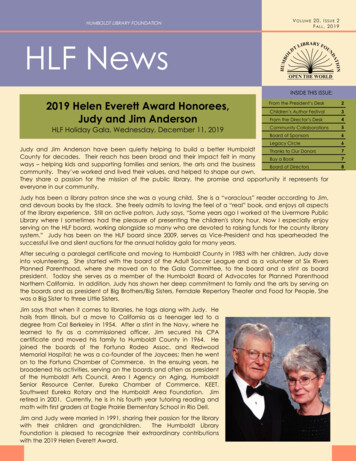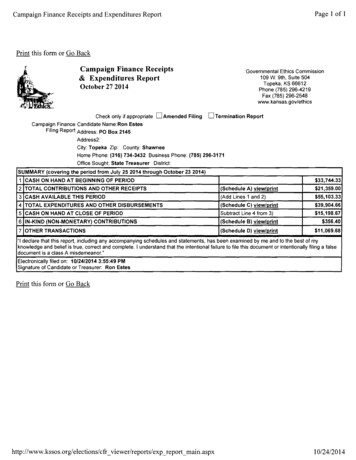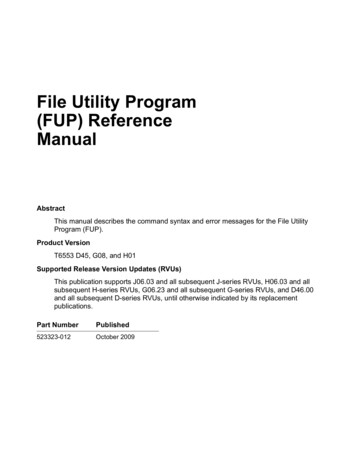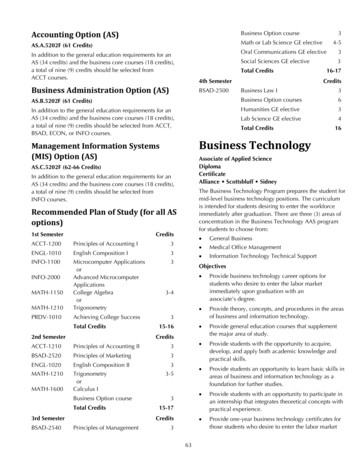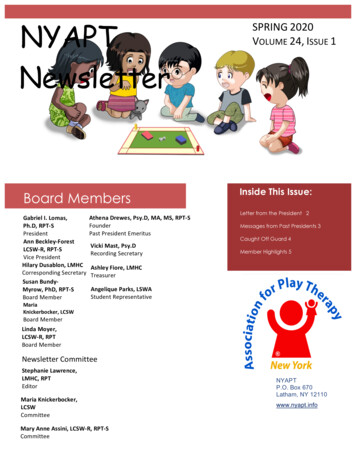
Transcription
NYAPTNewsletterBoard MembersGabriel I. Lomas,Ph.D, RPT-SPresidentAnn Beckley-ForestLCSW-R, RPT-SVice PresidentHilary Dusablon, LMHCCorresponding SecretarySusan BundyMyrow, PhD, RPT-SBoard MemberAthena Drewes, Psy.D, MA, MS, RPT-SFounderPast President EmeritusVicki Mast, Psy.DRecording SecretarySPRING 2020VOLUME 24, ISSUE 1Inside This Issue:Letter from the President 2Messages from Past Presidents 3Caught Off Guard 4Member Highlights 5Ashley Fiore, LMHCTreasurerAngelique Parks, LSWAStudent RepresentativeMariaKnickerbocker, LCSWBoard MemberLinda Moyer,LCSW-R, RPTBoard MemberNewsletter CommitteeStephanie Lawrence,LMHC, RPTEditorMaria Knickerbocker,LCSWCommitteeMary Anne Assini, LCSW-R, RPT-SCommitteeNYAPTP.O. Box 670Latham, NY 12110www.nyapt.info
NYAPT NEWSLETTERPAGE 2Letter from thePresidentBY GABRIEL I.LOMAS, PH.D, RPT-S-SDuring this time of warming weather and regrowth of nature, s Photoandby Unknownis licensedunderBY-NDotherand with friends to make memories. Unfortunately, gathering has been prohibited in most of New York since the middle ofMarch. This has caused barriers to connecting for nuclear families and extended families. Many weeks have passed sincefriends, family, and colleagues have seen each other. Children have been unable to see grandparents, aunts, uncles, cousins,and other loved ones. Furthermore, many have lost loved ones and funeral attendance has been restricted, resulting inbarriers to grieving.During the pandemic, we have seen alarming increases in trauma-inducing activities. As stressors compound, mediaoutlets have reported massive increases in calls to the National Suicide Lifeline. Relationships that were unhealthy haveresulted in increases in divorce as well as spikes in partner violence. The need for play therapists to address children’smental health seems greater today than in any other time in history. Yet, we are not allowed to sit together in the playroom.Crises are usually defined as an event which overwhelms our resources or coping skills and that has a clearbeginning and end. Unfortunately, the pandemic does not have clear “bookends” because the start of the pandemic hasbeen different from one community to another. Furthermore, although people are returning to work and other lifeactivities, we are currently in the middle of a crisis that has not ended. One thing is certain: Until we have a vaccine or otherclear treatment, we will continue to live in a transcrisis state.As I network with colleagues, I’m floored by the creativity of many play therapists. Our organization began thepandemic with a free webinar from NT-APT leaders who gave tips on connecting with kids during the pandemic. At thattime, it was unclear how long we would be quarantined but it was expected to be a matter of weeks. Today, still inquarantine, many play therapists are reporting growing practices. Families are recognizing the struggle and we are steppingup to meet their needs. I applaud our members for their dedication, commitment, and creativity.I want to close this message by reminding all who read this that we are only helpful to clients if we are in goodhealth ourselves. Be sure to consults with colleagues and take precautions for reopening. Furthermore, take care of yourown emotional health. Many of my colleagues report fatigue from working on the computer. Not only is it harder to connectvirtually, the screen itself can cause strain on the eyes. I was recently listening to a podcast which featured Dr. Bruce Perry.In speaking about self-care, he reminded listeners that dosage is probably the most critical aspect. Many clinicians aim foran hour of exercise to start or finish the day. Instead, Dr. Perry recommends six 10-minute exercise sessions spaced throughthe entire day. Additionally, seek supervision to make sure you are sharp and you are able to process the stressors of thechange so they don’t pop up in sessions.I wish you all a happy and healthy summer.Sincerely,Gabe Lomas, Ph.D., RPT-SNYAPT President
NYAPT NewsletterPage 3Messages from Past PresidentsHello NYAPT Members!These are stressful times as we deal with ourconfinement, navigating tele-health sessions, homeschooling for our children, worrying about loved onesgetting COVID-19 (or caring for them or ourselves),cooking, cleaning and regular chores, and juggling ourown mental health needs. Often our own needs are putlast, running out of time after the long list of otherpersonal demands. But self-care should not beoverlooked as you care for others. For if we do not recharge our own batteries and put on the air ‘mask’ (fromthe airplane) first, we have no energy left to help othersor ourselves. I hope all of you take a few minutes eachday or after sessions to do some deep breathing (even asyou read this), meditation (even for just 5 minutes at thestart and finish of your day, or throughout it), andrelaxation time and self-care. What you are doing makesa difference in the lives of others, as you navigate thechallenges in front of you. But take time to take care ofyourself! Reach out to peers to share your feelings andhelp lessen feeling overburdened and isolated via peersupervision and Zoom or Skype or FaceTimeopportunities. Know that you are not alone, and we areall in this together. This too shall pass! Keep up the goodwork you are doing for the children and families youwork with.Fondly,Athena A. Drewes, PsyD, MA, RPT-SFounder and President Emeritus of NYAPTOcala, FloridaAs one of NYAPT’S past presidents, I hope this challenge to ourprofession will be helpful to all front-line workers, whichincludes all of you. Not only do we worry about our immediatefamilies, but also those children and families that we treat. Ithink this situation can come under trauma as well as losscategories. I am no longer treating children (age 92), but Istill have a few adults and supervies (via Team Viewer). All ofthem have been so affected by not only virus cases, but theother huge issues our country faces. Be sure to vote!!! Also, Isecond Athena's comments about self-care, so incredibly neededat this time. Keep up the great work you are all dedicatedto. Fondly, Lois Carey, LCSW-R, RPT-Snot reliable or perhaps the Wifi in our homes was not"I view play therapists as frontline workers and viewthem as heroic in helping children and families throughthis pandemic which none of us have experienced inour adult lives and in no way did we have time toprepare for the challenges. Overnight we had to shiftto remote sessions using platforms that in some caseswere not reliable or perhaps the Wifi in our homeswas not up to the demands leading to audio or videofreezing and enormous frustration on the part of thetherapist and child alike. The challenges of engagingchildren through a screen and keeping them interestedfor 15 mins. or 30 mins. and in some cases 45 mins.added a number of gray hairs to many of us. Thedisruption to our intern and student training programshas been devastating both to the programs and thestudents. Yet, through it all we are all doing the bestwe can. I appreciate each and everyone of you andyou are indeed heroic as you continue to makeyourself available in whatever way possible to meetthe needs of children and families during thesestressful times. Thank you, for all you do! DavidDavid A. Crenshaw, Ph.D., ABPPClinical DirectorLicensed Psychologist, NYS #4376Board Certified Clinical Psychologist, American Boardof Professional PsychologyFellow, American Academy of Clinical PsychologyFellow, American Psychological AssociationRegistered Play Therapist-Supervisor--Association for PlayTherapyNYAPT Strong!I was driving my son home after an appointment last weekwhen I saw a road sign blinking the words “New YorkStrong”. I have to admit I was not prepared for the rush offeelings I experienced. I was (am) at a loss to find words todescribe the past three months. I glanced at my 20-year-oldson and realized he was a baby on 9/11. I reflected on thedifferent challenges we have faced during the time I havebeen a part of NYAPT. Through it all you have been suchdedicated healers and amazing sources of strength, comfortand hope for the children and families we serve. I wouldlike to echo past presidents Dr. Crenshaw’s thank you andDr. Drewes’ and Mrs. Carey’s reminders to take care ofyourselves! You are a huge part of what makes “New YorkStrong”!! Mary Anne Assini, LCSW-R, RPT-S
NYAPT NewsletterPage 4Caught Off GuardAnne Marie M Ramos, LCSW, RPT-SAs director of children’s services of a large children’s agency in NJ I was totally caught off guard when I was informed that wewere suddenly switching to telehealth sessions and could not return to the office. Being one of the least technologically mindedpeople I know, I had a steep learning curve. I could not let down the children, young adolescents and families who were my directclients as well as the staff who looked to me for guidance. There was also no easy way to find resources on providing telehealthplay-based therapy to families and children. I did do an initial literature search to no avail. Relying on my own creativity, I foundthat what worked best for my own clients was often helpful to my supervisees who were also developing creative ideas of theirown. One of the many strategies I used was to share short animations and videos and use them as a jumping off point foractivities and discussion to facilitate the goals for the therapy. Another was to create engaging and playful power points forinteractive activities or for skills development. I have developed a webinar for Rutgers University which will be shown in Junecalled Animations, Power Points, and Interactive Strategies for Play-Based Telehealth and On-Site Sessions. I have found thatsome of the strategies I tried were so effective that I will continue to use them when I return to an on-site setting.A list of resources is part of the webinar which I will share in this article in annotated form. Since beginning my “journey”into telehealth, I found that there were a number of excellent online resources which I will cite below:Resources: Website: www.lianalowenstein.com Access the author’s books, watch her videos and have access to the article,Creative Interventions for Online Therapy with Children: Techniques to build Rapport.YouTube channel: Tammi Van Hollander does an excellent series on working with children remotely.Rachel Alvater also has a YouTube video called Intro to Tele-Play Therapywww.gozen.com has free animations and free PDF’s for parents and children. The entire program can be purchasedfor therapists to work with children or can be purchased by their parents. This is an excellent program withanimations, follow up questions, and activities to help children and young teens with anxiety and negative thinking.It is based on positive psychology, CBT, neurobiology, mindfulness, and more.www.storylineonline.org. This website has famous actors reading to children. It is a wonderful tool for bibliotherapy.Any book by Julia Cook! This author writes in an engaging and fun way about many topics that can be difficult tobring up.www.speechmark.net for Feelings Color Cards. Because these cards are big they lend themselves easily todiscussion and opening up about feelings in a telehealth setting.TARGET program: www.advancedtrauma.com. An evidenced based program out of the University of Ct. thatwas discussed in the webinar and is used by the presenter for traumatized older children and teens who arechallenged by emotional regulation.Presenter’s email: annemarieramos1@gmail.com
NYAPT NEWSLETTERPAGE 5MEMBER HIGHLIGHTSF Lois Carey, LCSW-R volunteered on Give an Hour to provide 6 free sessions to first responders and others in needof some support. Ellen Maranca, LCSW, RPT-S Certified ART (Accelerated Resolution Therapy) Practitioner has been compilingresources. These resources include:- For Parents/Caregivers: Trying to understand and help children through big feelings can be a complicatedtask for parents! The coronavirus pandemic has created drastic changes for children's routines and lives ingeneral. They are likely going to have big feelings about it, but may not know how to express these in waysthat make sense to parents. They need support more than ever - but.so do we! So please take care ofYOURSELF too, at this time; that really is the most important thing you can do for others.- Feeling overwhelmed with trying to do it all? You are NOT alone! for-parents-during-this-time/- Online story books about the Coronavirus, generously compiled by LaurenStockly: d 8lAeABjot-Y- From this creative teacher's perspective, we are all on a Hero's Journey at this time. Help with navigatingthrough story and metaphor: mic-kids/- Here are two very useful resources for helping KIDS handle big feelings, and helping YOU to understandwhere their behaviors and feelings might be coming from as-something-else/ and https://gozen.com/11-things-to-say-when-kids-cry/- Thriving at Home: A workbook compiled by play therapists in Albuquerque, New Mexico to support familieswhile they are at home during the 2020 Coronavirus quarantine. The activities, worksheets, and strategiesare intended to be a supplement to weekly Tele-play sessions with a licensed mental health therapist.Created with the intention to be a tool to facilitate emotional regulation, open discussion, and healthyrelationships in the home. https://www.treehousenm.com/coronavirus?fbclid IwAR1rnQD4 KUZvsic1inicobwXwva4E7sGrhLnYkjRo5CGC564KBtnH9yAM
Clinical Director Licensed Psychologist, NYS #4376 Board Certified Clinical Psychologist, American Board of Professional Psychology Fellow, American Academy of Clinical Psychology Fellow, American Psychological Association Registered Play Therapist-Supervisor--Association for Play Therapy
